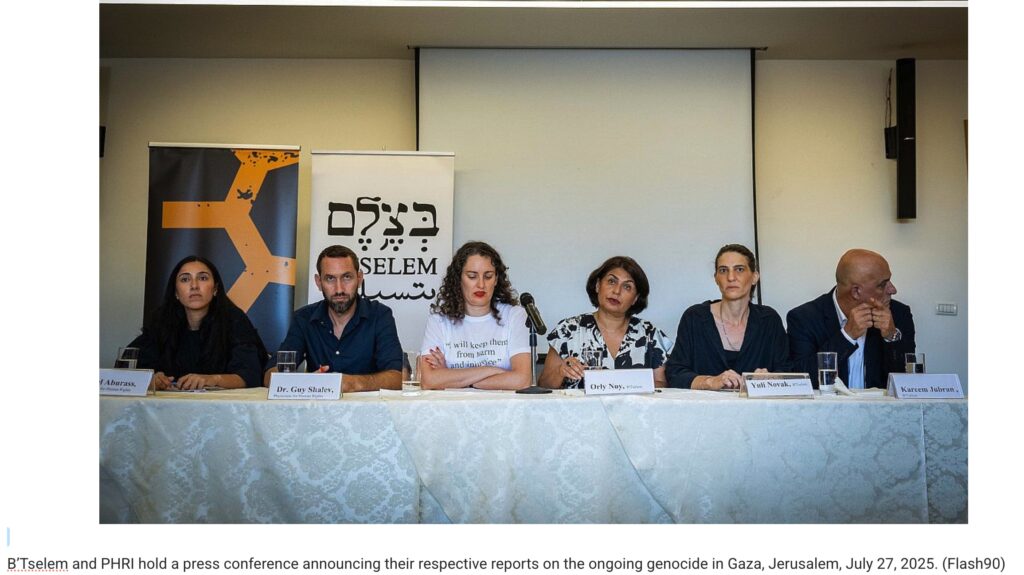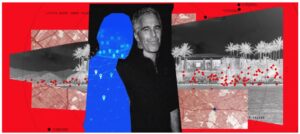By Shatha Yaish
After months of hesitation, B’Tselem and Physicians for Human Rights-Israel assert that the war is meant to erase Palestinian life — now and in the future.
After 22 months of war, starvation, and systematic destruction, two of Israel’s leading human rights organizations have concluded that Israel’s actions in the Gaza Strip constitute genocide.
This finding, issued Monday in two separate reports by Physicians for Human Rights-Israel (PHRI) and B’Tselem, marks a rupture within Israeli civil society. Until now, Israeli human rights organizations had largely stopped short of using the term “genocide,” even as Palestinian groups, Israeli genocide and Holocaust scholars, and international bodies like Amnesty International, Human Rights Watch, and Médecins Sans Frontières adopted it months ago.
Drawing on nearly two years of documentation, both groups argued that Israel’s actions in Gaza meet the definition of genocide as outlined in the 1948 Genocide Convention.
B’tselem’s report, titled “Our Genocide,” centers on Israel’s targeting of civilians and the systematic dismantling of Palestinian society in Gaza. PHRI’s report provides a health-based legal analysis of Israel’s deliberate destruction of Gaza’s healthcare system.
In a conversation with +972, B’Tselem Executive Director Yuli Novak described the decision to name genocide as the result of a long, painful process of internal reckoning. “Nothing prepares you for the realization that you are part of a society committing genocide,” she said. “This is a deeply painful moment for us.”
“What we see is intentional action — coordinated practices — aimed at destroying Palestinian society in Gaza. That is the exact definition of genocide: attacking civilians in order to destroy the group.”
When asked about the anticipated impact of B’tselem’s report, Novak admitted that it alone cannot bring an end to the genocide. “What we do hope is to raise our voices as the people who live here, Israelis and Palestinians,” she explained. “We have the ability to understand the situation deeply — both to bring the voices of the victims, which is our first and foremost moral obligation, but also to bring forth an analysis of how the genocidal system works. In order to fight against political systems, you have to understand them.
“We are hoping that people will hear our voices and decide to take action, and will understand it is not a local problem of Israelis and Palestinians,” Novak continued. “The Palestinians are no doubt the victims. But erasing humanity is something that is supposed to bother every human being.”
Unmaking a society
B’Tselem identifies four main pillars of Israel’s genocidal campaign: mass killings, violent population transfers, systematic destruction, and the dismantling of Palestinian society at every level.
Notably, the report warns that these actions will not remain confined to Gaza. “This genocidal regime controls Palestinians in Gaza, but also Palestinians in the West Bank as well as inside Israel,” said Novak. “Some of these practices have already spilled over into the West Bank — on a very different scale, but the logic is the same. Sometimes it’s the exact same commanders and units that operated in Gaza that are now being moved into the West Bank.”
Novak emphasized that genocide is not merely a legal category, but a distinct mode of political and social violence. “There is something fundamentally different about genocide than other atrocities,” she explained. “It’s the complete erasure of the humanity of the victims. It marks each and every person — regardless of what he or she thinks, what they did, or who they are — not as individuals, but as a mass that you can target.”
The objective, she added, is not only to kill. “It’s not just about starving people or denying them medical aid, it’s about taking apart a society and making sure that this group, as a group, wouldn’t be able to exist in the future.”
One dimension of that societal destruction is the devastation of the family unit. Between the start of the offensive and March 2025, around 14,000 women were widowed and left solely responsible for their families, while approximately 40,000 children lost one or both parents. According to B’Tselem’s report, this makes Gaza possibly “the largest orphan crisis in modern history.”
Another example Novak cites is the targeted destruction of Gaza’s education system. “Think about it: students in Gaza have had no schools or higher learning institutions to go to for the last two years, alongside the ongoing trauma they are suffering. This constitutes not only a destruction of life in Gaza in the present, but also into the future.”
B’Tselem, she said, feels a particular responsibility to name these crimes given its location within the society perpetrating them. “We understand the collective that is carrying out the genocide — the society that we ourselves are a part of. And that brings us to do whatever we can, also to tell this story to Israelis, and try to call them to see what they are unable, or don’t want, to see.”
Waging war on healthcare
While B’Tselem’s report concentrates on the broad social and political structures being dismantled in Gaza, PHRI’s report narrows in on a critical pillar of civilian life: the health system. Titled “Destruction of conditions of life: a health analysis of the Gaza genocide,” the report presents a detailed analysis documenting how Israel has thoroughly destroyed Gaza’s ability to care for its population.
Through direct attacks on hospitals, obstruction of medical evacuations and entry of medical aid, and the targeting of healthcare workers, PHRI argues, Israel has engineered a cascading failure of health services that constitutes genocidal intent. “The intention behind these policies should be understood as indivisible from the destruction of the health system,” the report reads. “Each policy alone may raise grave legal concerns. Together, they form a plan and policy of systemic erasure.”
Over the past 22 months, Israel’s campaign has decimated Gaza’s health infrastructure “in a manner that is both calculated and systematic,” the report notes. “Beginning with the bombing and forced evacuation of hospitals in northern Gaza, the collapse extended southward as displaced populations overwhelmed remaining facilities, which were then subjected to further bombardment, siege, and resource deprivation.”
The result, the report shows, has led to a complete breakdown of Gaza’s ability to provide basic care. “Gaza’s health system has been systematically dismantled — its hospitals rendered non-functional, medical evacuations blocked, and essential services like trauma care, surgery, dialysis, and maternal health eliminated,” it reads.
PHRI concludes that these actions are not incidental to war, but deliberate and targeted. They fulfill multiple criteria under the Genocide Convention: killing members of the group, causing serious bodily and mental harm, and inflicting conditions of life intended to bring about the group’s destruction.
In a conversation with +972, Aseel Abu Ras, director of PHRI’s department for the occupied Palestinian territories, emphasized that while hospitals can theoretically be rebuilt (assuming Israel allows in building materials), the destruction of the healthcare workforce is immeasurable.
“More than 1,500 doctors and healthcare workers have been killed in Gaza, and over 300 detained, according to Gaza’s Health Ministry,” she said. “When you kill doctors, you kill years of specialty and expertise. They are the backbone of Gaza’s fragile health system.”
In this way, she warned that Israel’s targeting of health infrastructure is not just about the present moment but about erasing the possibility of long-term recovery — and any Palestinian future in Gaza. “It’s about destroying Gaza’s ability to heal and rebuild.”
By documenting what is happening in Gaza as genocide, grounded in both legal and medical evidence, Abu Rass told +972 that the report aims to move international and governmental actors from debate to emergency intervention.







